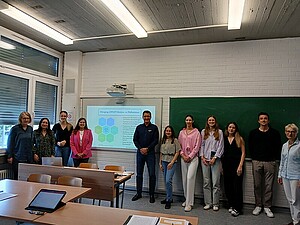Projects
Welcome to our project page for the degree programs Health Economics in Practice (GiP) and Health Care Management (HCM)! Here we present innovative projects that are carried out in close cooperation with various institutions in the healthcare sector. These practice-oriented projects offer our students the opportunity to apply their theoretical knowledge and gain valuable experience in real working environments.
The benefits of such collaborations are manifold: students have opportunities for personal and professional development, while at the same time making important contacts in the industry. Institutions benefit from the fresh ideas and perspectives that our students contribute, as well as from the opportunity to get to know potential future employees. In addition, solutions to current challenges in the healthcare sector can be developed through joint projects.
If your institution is interested in a collaboration and would like to realize exciting projects together with us, we look forward to hearing from you! Let's work together to promote innovative approaches in the healthcare sector.
Bachelor's degree program in Health Economics in Practice (GiP)
Do you have a project that you would like us to work on?
Please contact the managing director of the degree programs:
Ms. Marcella Eierdanz
0621/5203-268
marcella.eierdanz@ 8< SPAM protection, please remove >8 hwg-lu.de
Recruiting and retaining nursing staff for outpatient care services
Practical and complex - two keywords that describe the case study as part of the dual health economics course. Over the course of the 4th semester, students on the "Health Economics in Practice" degree programs worked on a case study on the topic of recruiting and retaining nursing staff in outpatient care services. The case study was carried out in collaboration with Rudolf Naumann, the owner of SEBENA, an outpatient nursing service based in Ludwigshafen and Mannheim. The cooperation with the practice partner reflects a core idea of the degree programs and offered an interesting exchange. Outpatient care is an industry affected by a shortage of skilled workers. The aim of the case study was to identify and develop specific measures for recruiting and retaining staff for outpatient care services. The students achieved this goal by working on various work packages with a focus on gathering information on the shortage of skilled nursing staff, the market for outpatient nursing services and the remuneration systems for nursing services in accordance with SGB V and SGB XI. Based on this, the mandate and procedure were specified in consultation with the practice partner SEBENA. The as-is analysis of working conditions in the care sector, job satisfaction and problem areas as well as the detailed personal discussions with SEBENA's care professionals formed the basis for the subsequent SWOT analysis. Four key measures that were identified as part of the case study were participative management models, digitalization and technological innovations as well as flexible working time models. It was exciting to get to know the care sector. The future viability and practical orientation of the degree programs became very clear in the case study. The case study was supervised by Prof. Dr. Eveline Häusler and Prof. Dr. Elke Raum.
Students: Sofia Alessi, Anastasia Hart, Marvin Kermer, Olivia Recktenwald, Laura Sklorz, Saskia Spoor, Sophie Stronz, Beyza-Nur Yilmaz
Master's degree program in Health Care Management (HCM)
Do you have a project that you would like us to work on?
Please contact the program manager of the degree programs:
Ms. Christine Preis
0621/5203-182
christine.preis@ 8< SPAM protection, please remove >8 hwg-lu.de
Subject areas: Business Innovation, Science and Transfer
Final theses
Here we present a selection of particularly innovative and practice-relevant theses written by our students. These theses not only reflect the commitment and creativity of our students, but also offer valuable insights into current topics and challenges in the healthcare sector.
Can you imagine offering a practical topic in your institution? Here you will find an overview of subject areas, framework conditions and contact persons. We look forward to hearing from you.
Bachelor's degree program in Health Economics in Practice (GiP)
Processing time: 3 months
Length: 30 - 60 text pages (incl. figures and tables)
Subject areas: Medicine, public health, prevention, health promotion
Master's degree program in Health Care Management (HCM)
Processing time: 3 months
Length: 30 - 60 text pages (incl. figures and tables)
Subject areas: Health services research, prevention, health promotion, health services management
Future-oriented recruitment of nursing staff from third countries to secure and further develop long-term care: stocktaking and recommendations for action using the example of Philippine nursing staff
Ensuring the provision of nursing care for the elderly is one of the most significant current and future challenges facing society. In view of the acute "nursing shortage", geriatric care facilities have been recruiting nursing staff from third countries, i.e. countries outside the EU, for several years. One of the most important recruiting countries is the Philippines.
Recruitment poses major challenges for care facilities: The recruited nurses must be recognized as professionals as quickly as possible, prepared efficiently and effectively for their professional tasks and, above all, retained in the facilities for as long as possible.
The research work is based on two hypotheses: On the one hand , eldercare facilities can achieve retention of recruited nurses through appreciative support in social and professional integration. On the other hand , Filipino caregivers have special skills for caring for the elderly due to their studies and cultural socialization. Consequently, there is a close relationship between integration, skills development and retention of recruited caregivers. This study examines the monitoring, support and promotion of Filipino caregivers in elderly care facilities that have been recruiting for at least three years. For this purpose, expert interviews are conducted with those responsible for recruitment and integration.In order to analyze the integration process and the competencies of Filipino nurses from a second perspective, experiences and assessments of agencies that recruit in the Philippines as well as in other countries are collected. In view of the two hypotheses, the work is oriented towards two research areas. In the first research area, the expert interviews are used to evaluate which measures are necessary for the integration and long-term retention of Filipino nurses. Both the professional aspects of integration (guidance, induction, dealing with stereotyping in the teams, preparation for state recognition as a professional) and the personal and social dimensions (housing, leisure activities, family reunification) are examined. The second research area evaluates whether and how Filipino caregivers
contribute to the further development of long-term care through their a) care-related and b) social-emotional skills.
The background of the expert interviews is formed by analyses of the qualification of care workers in the Philippines, the values and norms there, the German recruitment and recognition regulations as well as a historical excursus on the first phase of the recruitment of Filipino care workers in the 1960s.
The key findings: Long-term recruitment of Filipino nurses for elderly care is possible. Facilities and elderly people in need of care gain highly motivated and highly competent caregivers. Filipino nursing staff settle in and familiarize themselves quickly, they are stress-resistant and resilient in everyday working life; they are popular and respected among colleagues and residents - especially due to their social-emotional skills. They are interested in learning and further training and are open to company career plans.
The results of the expert interviews are reflected on in terms of their transferability to nursing staff from other countries of origin and result in recommendations for action for recruiting nursing facilities. Key tasks of successful recruitment include the promotion of language skills, support with family reunification, planned induction, support with recognition as a specialist and career prospects for the recruited nursing staff.
(Abstract of Marcella Eierdanz's master's thesis)

